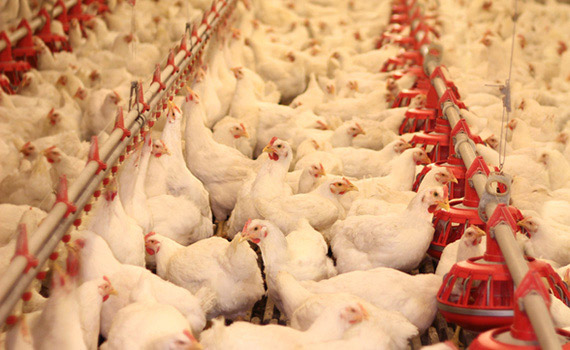Section 2 | Prevention Strategies for Necrotic Enteritis
Industry
Page 12 /
Promoting a Healthy Immune System
Vaccination
Coccidiosis is one of the most important risk factors associated with NE. Therefore, reducing the impact of coccidiosis through vaccination could lessen the impact of NE on the flock. As mentioned in the previous page, chicks can be given vaccinations at 5 days of age.
But What About Vaccines for NE?
Researchers have recently identified what appears to be the primary toxin responsible for NE – the NetB toxin1. Previous NE vaccines have focused on the alpha toxin of C. perfringens and, as it turns out, this toxin likely wasn’t causing NE. That is why early vaccine strategies had limited success in NE control1. While there are no commercially available NE vaccines on the market, researchers and animal health companies are working on solutions that will reduce the impact of NE in poultry2.
Prebiotics – Yeast Cell Wall Extract
Prebiotics are products that influence the growth of bacteria in the gastrointestinal tract. Feeding yeast cell wall extract (YCW), one of the more established prebiotic products, is associated with a variety of effects that include:
- Beneficial immune control
- Modulation of gut microflora
- Improved gut health3
When fed continuously, YCW can suppress “bad inflammation” in the gut (reduced gut damage) and increase antibody production (help bind and kill harmful bacteria like C. perfringens)4. Other benefits of YCW include direct antibacterial activity and improved production efficiency3. Results may vary based on ration composition, length of feeding, and product used. That’s why it is imperative to work with your nutritionist and veterinarian to find the right product and protocol for your flock.
Anything that produces stress in poultry has the potential to inhibit the immune system
Management
Anything that produces stress in poultry has the potential to inhibit the immune system, which provides an opportunity for disease
Stocking Density
Inappropriate stocking density can have a profoundly negative impact on health and performance. Highly stocked birds are under immense stress because of competition for resources, and changes to air quality, and are less able to mount an immune response to NE5.

Source: Poultry Health Today
Temperature
Temperature extremes (heat or cold stress) also suppress the immune system and can produce more profound NE outbreaks5. Animals that must use energy to keep warm or cool off cannot put that energy towards their keeping immune systems functioning at a high level — something’s got to give! Ensuring appropriate temperature control and providing ample clean, dry bedding will reduce disease in your flock.
Other microenvironmental factors (such as humidity and ammonia concentration) also likely play a role in immune suppression, and as a consequence, NE expression in a flock5.
References
- M’Sadeq SA, Wu S, Swick RA, Choct M. Towards the control of necrotic enteritis in broiler chickens with in-feed antibiotics phasing-out worldwide. Anim Nutr [Internet]. 2015;1(1):1–11. Available from: http://dx.doi.org/10.1016/j.aninu.2015.02.004
- Wilde S, Jiang Y, Tafoya AM, Horsman J, Yousif M, Vazquez LA, et al. Salmonella-vectored vaccine delivering three Clostridium perfringens antigens protects poultry against necrotic enteritis. PLoS One. 2019;14(2):1–18.
- Caly DL, D’Inca R, Auclair E, Drider D. Alternatives to antibiotics to prevent necrotic enteritis in broiler chickens: A microbiologist’s perspective. Front Microbiol. 2015;6(DEC):1–12.
- Xue G Da, Wu SB, Choct M, Swick RA. Effects of yeast cell wall on growth performance, immune responses and intestinal short chain fatty acid concentrations of broilers in an experimental necrotic enteritis model. Anim. Nutr. [Internet]. 2017;3(4):399–405. Available from: https://doi.org/10.1016/j.aninu.2017.08.002
- Tsiouris V. Poultry management: a useful tool for the control of necrotic enteritis in poultry. Avian Pathol. 2016;45(3):323–5.
